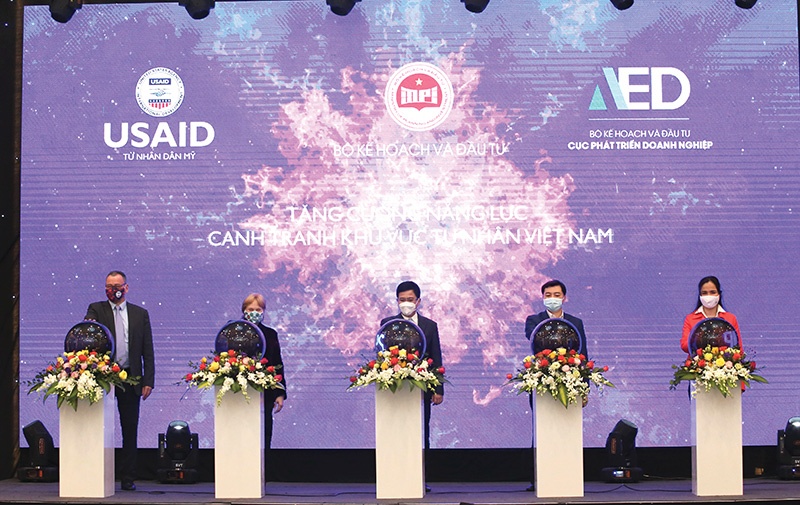US amplifies bilateral ASEAN priorities
 |
| The Ministry of Planning and Investment and USAID launched a $36 million scheme for private sector competitiveness |
Since its strong commitment at the ninth ASEAN-US Summit last October, the US administration has provided major support to the bloc for economic recovery, including assistance for Vietnam.
More than two million doses of Pfizer vaccine arrived in Hanoi last week, bringing the total number of vaccines that the US has supported in Vietnam through the COVAX Program to more than 28.2 million doses.
“We are proud to partner with Vietnam in the fight against COVID-19 and in building back better as we work toward recovery together,” said US Ambassador to Vietnam Marc Knapper.
In another case, on February 18, the US Agency for International Development (USAID) provided lifesaving equipment to the Department of Health in the south-eastern province of Tay Ninh for the province’s fight against the pandemic.
The donated equipment, which consists of 10 patient monitors, 40 infusion pumps, 200 fingertip pulse oximeters, and 20,000 masks together valued at $250,000, will enhance the health centre’s COVID-19 case management. Patient monitors allow hospital staff to efficiently track patient vital signs and quickly respond to changes in patient conditions. Infusion pumps are programmed to deliver medication, nutrition, and fluids to patients. Fingertip pulse oximeters are non-invasive devices that estimate the amount of oxygen in a patient’s blood.
Over the coming months, USAID is also installing liquid oxygen tanks and piping systems at other places in Tay Ninh. Combined, these systems will be able to support the delivery of medical oxygen to nearly 200 patients daily.
In total, USAID is investing $5.5 million in pandemic-related training and equipment in many localities including Binh Duong, Dong Nai, Ho Chi Minh City, Long An, Tay Ninh, and other COVID-19 hotspots.
Top commitments
US President Joe Biden will host the leaders of ASEAN at the 10th ASEAN-US Summit on March 28-29 in Washington. It is expected that besides cementing economic ties, the US and the bloc will also continue to deepen healthcare cooperation.
Vietnamese Prime Minister Pham Minh Chinh will also attend the summit and engage in bilateral activities in the US, said Vietnam’s Ministry of Foreign Affairs.
At the previous summit, President Biden announced a programme to provide $102 million in new initiatives to expand the US-ASEAN Strategic Partnership, reflecting the Biden-Harris administration’s deep commitment to the bloc’s central role in the US vision for a free and open Indo-Pacific.
The US will provide $40 million in new efforts to accelerate joint research, strengthen health system capacity, and develop the next generation of human capital in health through the US-ASEAN Health Futures initiative. These efforts build on the more than $3.5 billion the US has invested in supporting public health in the region over the past 20 years. The initiative will both help address the current pandemic and strengthen the region’s ability to prevent, detect, and respond to future zoonotic and other infectious disease outbreaks.
In addition, the US continues efforts to promote economic growth to build back better from the economic damage wrought from the pandemic. The US plans to provide $10 million in new loans and intends to offer an additional $10 million to support US-ASEAN cooperation in trade and innovation.
Additionally, the US is also committed to providing $16 million in education-related loans, $1.5 million for English language teacher training, and also wants to offer $4 million to promote gender equality. The initiative’s activities include the launch of a new 20-year loan from the US International Development Finance Corporation to support Fulbright University Vietnam in Ho Chi Minh City.
President Biden has underlined the importance of the strategic partnership between the United States and ASEAN, highlighting new efforts to expand high-level cooperation in health, climate, energy, transportation, and gender empowerment.
“He reiterated the US commitment to ending the pandemic and building back better to prepare for the next, including making available more than 40 million vaccine doses and more than $200 million in emergency health and humanitarian assistance to ASEAN member states to fight COVID-19,” said the White House in a statement.
To expand its trade and investment with Vietnam and the region as a whole, through the ASEAN Single Window (ASW), USAID has continued to work with the bloc to deploy a self-certified system to expedite select traders in securing government certificates of origin to qualify for lower tariff rates.
“We have reached the first step of linking the ASW with the United States Customs and Border Protection’s Automated Commercial Environment to share electronic plant inspection certificates between ASEAN and the US,” said a statement from the US Mission to ASEAN.
About 90,000 documents are annually issued by ASEAN and the US, totalling about $13 billion of two-way trade revenue. Expansion of the ASW allows for increased intra-ASEAN trade and will eventually lead to streamlined trade with the US once both sides’ electronic commercial systems are linked.
Furthermore, the US is extending its support for ASEAN, and Vietnam in particular, in improving corporate competitiveness.
On January 18, USAID and Vietnam’s Ministry of Planning and Investment launched a 5-year, $36 million project focused on building the competitiveness of the country’s small and growing businesses.
These businesses are key contributors to Vietnam’s growth, accounting for 40 per cent of GDP and 60 per cent of total employment. However, they face barriers impeding their continued and sustained growth, including new technologies, networking, market links, and lack of access to management training and skills-building opportunities.
“This new project is our flagship effort to help the country harness its entrepreneurial spirit in facilitating a dynamic, Vietnam-led transformation of the private sector into one that can compete globally, and provide more equal opportunity for all,” said USAID mission director Ann Marie Yastishock.
Expecting momentum
During her visit to Vietnam last August, US Vice President Harris reaffirmed the US commitment to a strong, prosperous, and independent Vietnam, as well as a free, open, healthy, and resilient Indo-Pacific region.
The Biden administration also issued the Interim National Security Strategic Guidance in March 2021, with the intention of reengaging with Southeast Asia as part of its larger strategy of giving priority to the Indo-Pacific. This document listed Singapore and Vietnam as the two priority security partners in Southeast Asia.
Elevating bilateral relations to a strategic partnership would seem befitting of the ascending cooperation between the two countries and set the ground for more strategic cooperation, experts said.
Explaining why Vietnam is so important to the US, Carl Thayer, emeritus professor at the University of New South Wales, said that since the Obama administration, every US national security strategy has identified Vietnam as a key potential security partner of the US. This was also true for the Trump administration.
“Under the Biden administration, developing a partnership with Vietnam is a key priority,” Thayer said. “Vietnam is important to the US because it also plays a constructive role in ASEAN and is well-respected by the international community as evidenced by its election twice as a non-permanent member of the UN Security Council. Hanoi also served as the venue for President Trump’s second summit with North Korea’s leader Kim Jong-un in early 2019.”
| Adam Sitkoff-Executive director American Chamber of Commerce in Hanoi
I am pleased that President Biden has invited Prime Minister Pham Minh Chinh and other ASEAN leaders for a summit in Washington on March 28-29. Trade, investment, and transitioning to cleaner energy sources will be discussed as well as other topics important to Vietnam. The most important factor for a favourable investment climate and maintenance and growth of manufacturing supply chains is a fair, transparent, predictable, and streamlined regulatory environment that values innovation - not only to attract new investment but also to maintain and grow the investment already here. We will continue to advocate for the strengthening of the US-Vietnam trade and investment partnership. Greater transparency and predictability in Vietnam’s tax system would strengthen Vietnam’s investment climate, particularly avoidance of retroactive rulings and assessments. The need for advance price agreements is important as supply chain inputs can cross multiple borders and tax assessment must work overall. The ability to obtain these agreements will reduce the time and uncertainty that characterise many tax audits and will help facilitate the greater integration of Vietnam-based enterprises into global supply chains. We also encourage Vietnam to seek mutual ratification and implementation of a bilateral tax treaty with the US and to respect the commitment to avoid double taxation in the interim. The Vietnamese government has taken timely and appropriate actions to support the business community. Resolution No.43/2022/QH15 on financial and monetary policies to support socioeconomic recovery is particularly appreciated. Although Vietnam maintained positive economic growth during the pandemic, many small- and medium-sized businesses in hard-hit industries such as tourism, hospitality, food and beverages, and transportation have either downsized or suspended operations. To support economic recovery, it is necessary for the government to continue the reduction and deferred payment of corporate income tax in 2022 and 2023. Tax provisions in Vietnam’s new rules on e-commerce tax under Circular No.80/2021/TT-BTC are problematic. The new rules address the taxation of e-commerce business on foreign suppliers. There are, however, significant areas that need further clarification to avoid this circular inadvertently constraining growth in this important sector of the economy. Major issues include tax registration by foreign suppliers; tax treaty protection for foreign suppliers; tax withholding obligation by banks; and potential double taxation. We welcome the implementation of Vietnam’s e-invoice requirements as a positive step towards Vietnam’s digitalisation. Its members are taking steps to implement the new rules established under Decree No.123/2020/ND-CP and Circular No.78/2021/TTBTC by July 1. There appears, however, to be a difference in implementation between jurisdictions with regards to the timing of implementation of authentication versus unauthenticated models. Several of our members have received communications from local tax authorities requesting they implement before the July 1 deadline, or other additional requirements that cause confusion and concern for businesses. We welcome the government’s enthusiasm to implement e-invoicing but ask for patience to allow companies to integrate the new systems into their processes to meet the implementation date. The stability and consistency of the local master plans and guidelines are important for businesses. Changes to the local master plans and guidelines should not cause changes, delays, or any negative impacts on the locations and developments of investment projects. As environmental, social, and governance criteria increasingly become global standards, Vietnam also needs to have a regulatory environment that facilitates investors meeting such criteria. Increased use of generally accepted accounting principles will make it easier both for foreign companies to find local partners, as well as for Vietnamese companies to invest or list overseas. |
What the stars mean:
★ Poor ★ ★ Promising ★★★ Good ★★★★ Very good ★★★★★ Exceptional
 Tag:
Tag:
Related Contents
Latest News
More News
- State corporations poised to drive 2026 growth (February 03, 2026 | 13:58)
- Why high-tech talent will define Vietnam’s growth (February 02, 2026 | 10:47)
- FMCG resilience amid varying storms (February 02, 2026 | 10:00)
- Customs reforms strengthen business confidence, support trade growth (February 01, 2026 | 08:20)
- Vietnam and US to launch sixth trade negotiation round (January 30, 2026 | 15:19)
- Digital publishing emerges as key growth driver in Vietnam (January 30, 2026 | 10:59)
- EVN signs key contract for Tri An hydropower expansion (January 30, 2026 | 10:57)
- Vietnam to lead trade growth in ASEAN (January 29, 2026 | 15:08)
- Carlsberg Vietnam delivers Lunar New Year support in central region (January 28, 2026 | 17:19)
- TikTok penalised $35,000 in Vietnam for consumer protection violations (January 28, 2026 | 17:15)























 Mobile Version
Mobile Version